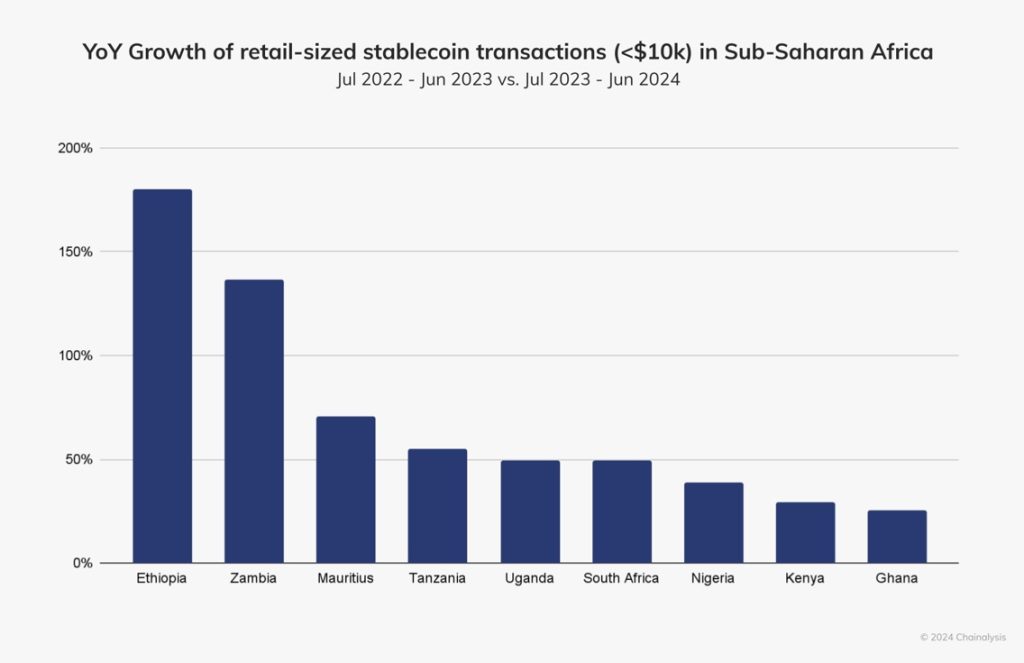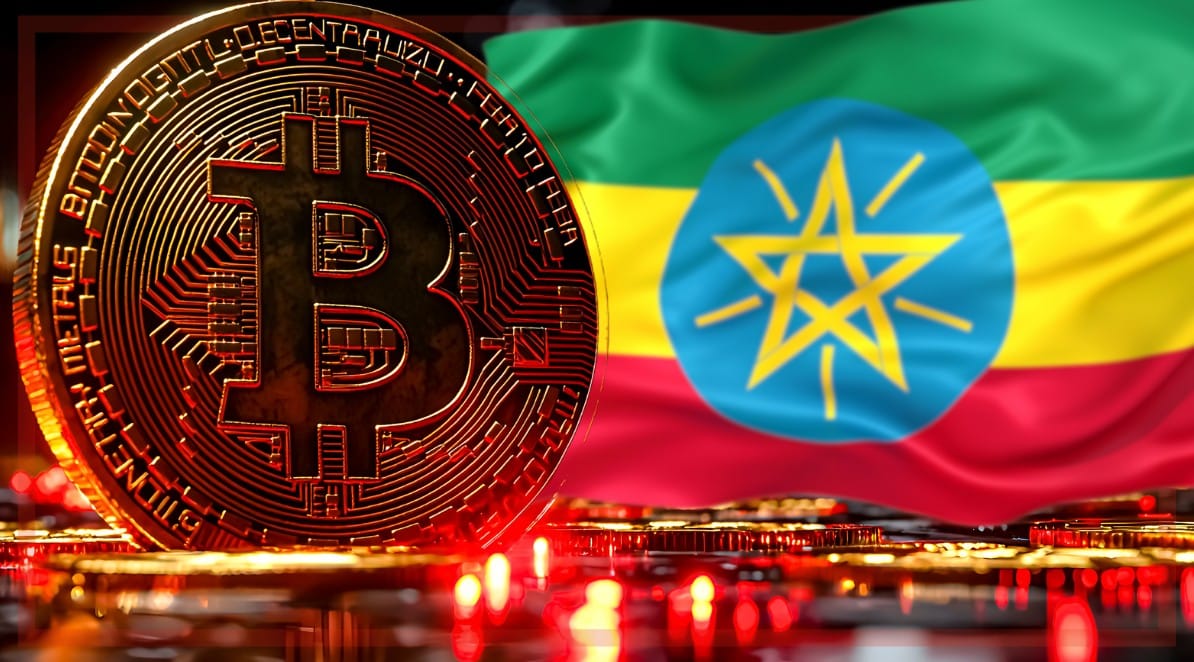Ethiopia’s crypto scene is fast-growing. Chainalysis ranks it 12th globally in grassroots crypto adoption. This comes as Ethiopia’s population swells to over 130 million, with a median age of approximately 20 years, and living costs surge. Inflation ran around 23.9% in 2024, and the birr recently lost roughly 25 – 30% of its value against the dollar.
In this squeeze, many young Ethiopians view bitcoin and other digital assets as an escape hatch. Reports note Ethiopia now has about 1.8 million crypto users who are mostly students, freelancers, and low-to-middle income earners.
Such figures far surpass a niche. Adjusted for purchasing power, on-chain crypto flows into Ethiopia now rival much larger economies.
Crypto Appeals as a Quasi-savings Tool
Crypto appeals as a quasi-savings tool, hedges against inflation, or a way to hold “digital dollars” (USD-pegged stablecoins) when local currency crumbles. With formal banks slow or charging high fees for foreign transfers, crypto offers cheaper, faster remittance rails.
Notably, retail transfers via crypto have exploded. Ethiopia saw 180% year-on-year growth in retail-sized stablecoin trades, even as the birr plunged by around 30% in mid-2024.
In short, a young, tech-savvy generation under economic pressure is turning to bitcoin, ether, and stablecoins to protect wealth and send money abroad.
Cheap Power and P2P: Building Ethiopia’s Crypto Market
Bitcoin mining is a major driver. Ethiopia’s cheap hydroelectric power — roughly $0.03–$0.05/kWh — has attracted miners since the government began licensing firms in 2022, generating about $55 million in mining-license revenue in the first 10 months of 2024. Although the program was paused in Aug 2025 as grids tightened, cheap power and rising local investment have continued reinforcing bitcoin’s role as “digital gold.”
Crypto access is still dominated by P2P trading. Ethiopia formally bans crypto payments, yet platforms like Bybit (P2P), Paxful, and African exchanges let users buy BTC or ETH directly with birr. These apps function as informal remittance channels.
By late 2025, authorities quietly moved to throttle P2P. Binance’s site and other exchanges were blocked. VPNs became necessary, and “Buy” ads in Birr were suspended, reflecting concerns over unregulated forex flows. Still, most Ethiopians access crypto through smartphones and P2P apps, which continue to operate.
Ethiopia Electric Power (EEP) has earned $200mln from bitcoin miners during the first six months of 2025… pic.twitter.com/fZiCsG20PQ
— Kal Kassa 🇪🇹🇺🇸 (@KalKassa) July 3, 2025
Ethiopia’s Crypto Regulatory Reversal
Ethiopian regulators have swung back and forth on crypto. In June 2022, the National Bank of Ethiopia (NBE) declared all crypto trading illegal, warning that “Birr is the only legal tender.” For months, anyone dealing in bitcoin risked penalties. But by late 2022, the stance shifted. The Information Network Security Agency (INSA) ordered all miners and exchanges to register, signaling a move from outright prohibition to supervised activity.
By 2024, the NBE began issuing mining-only licenses (crypto payments remained banned). Licensed miners must follow AML/KYC rules, and mining income is taxed as corporate revenue.
A broader framework is now in progress. The NBE, Capital Markets Authority, and tech ministries are drafting rules for digital assets, and a “Digital Birr” CBDC is under study. For now, crypto sits in a gray zone. Blockchain projects for ID and land registry are encouraged, but private crypto transactions remain restricted. Officials insist crypto cannot threaten financial stability, even as they quietly engage exchanges. Recent Binance–regulator talks show Ethiopia’s intent to curb crypto-driven parallel forex markets.
Remittances and Stablecoins: Crypto as a Financial Bridge
A massive remittance inflow also fuels crypto use. Ethiopia pulled in over $6 billion in remittances in 2023/24, about a 50% jump from the year before. Yet traditional channels are slow and costly. Stablecoins, digital tokens pegged to the US dollar, have emerged as a popular tool. Chainalysis notes Ethiopia is “its fastest-growing market for retail-sized stablecoin transfers”.

When the birr tumbled, many businesses and individuals switched to USDT or USDC as a proxy dollar. Platforms like Yellow Card and local fintechs let diaspora Ethiopians send money by buying USDT and transferring it to recipients, who then cash out into birr. This can be cheaper and faster than banking wires. As one analyst notes, in Africa, “stablecoins are a proxy for the dollar” and “provide a reliable way to store value and facilitate international payments.” In Ethiopia’s case, stablecoins help households preserve remittance value amid inflation and currency volatility.
The Future of Crypto in Ethiopia’s Economy
Crypto in Ethiopia remains niche but is steadily expanding. A young, tech-savvy population facing economic strain increasingly treats digital assets as a parallel financial lifeline. Bitcoin and Stablecoins dominate as stores of value, while USDT is widely used for dollar transfers. Most users rely on global platforms like Bybit, Binance, and Paxful, along with other Africa-focused services. Banks remain distant, and formal crypto investing is still unregulated, though the government’s shift from bans to selective licensing signals an attempt to balance innovation with control.
Tighter KYC/AML rules and a potential digital birr could eventually pull crypto activity into the formal system.
For now, millions of Ethiopians quietly save, trade, and send money through crypto outside traditional banks. As the Birr weakens and inflation rises, digital assets have become a practical part of Ethiopia’s financial toolkit, reflecting its growing place in global crypto use.
#Crypto #Ethiopia #Adoption #DigitalBirr
Author: Ayanfe Fakunle
The editorial team at #DisruptionBanking has taken all precautions to ensure that no persons or organizations have been adversely affected or offered any sort of financial advice in this article. This article is most definitely not financial advice.
See Also:
Will The Devaluation Of The Ethiopian Birr (ETB) Stoke Inflation? | Disruption Banking
Chinese Bitcoin Miners Seek New Haven In Ethiopia | Disruption Banking
How Strong Will The Ethiopian Birr (ETB) Be In 2024? | Disruption Banking
















